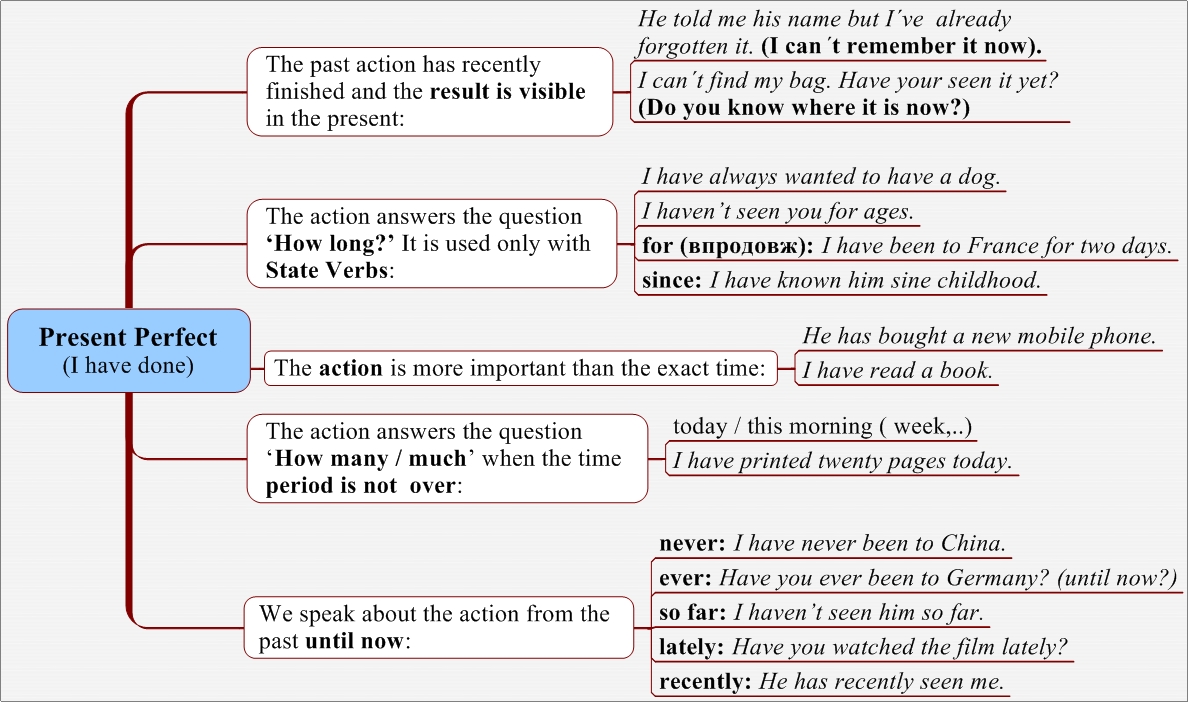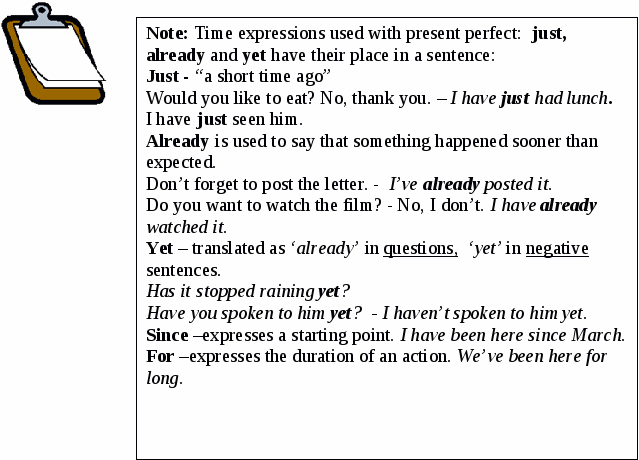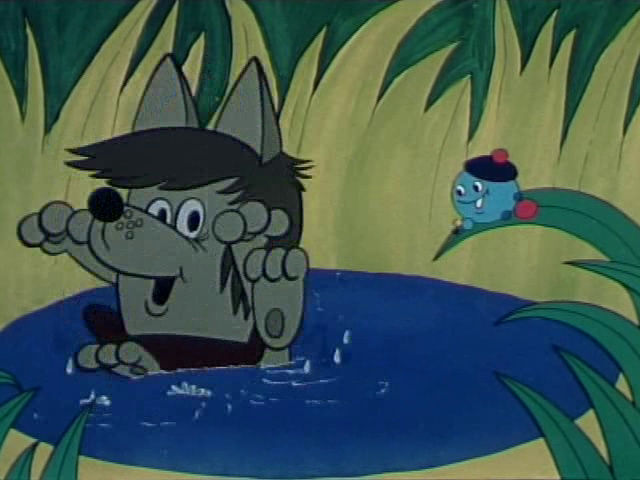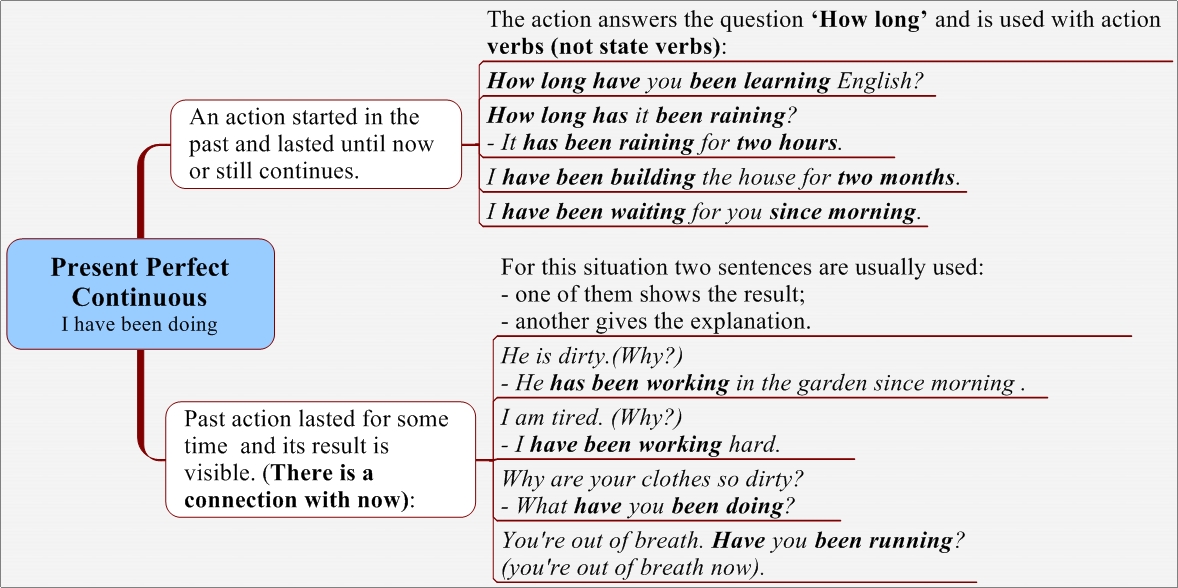Посібник з інтенсивного навчання англійської мови (для студентів внз спеціальності початкова освіта) Частина перша Київ 2013 удк ббк
 Скачать 5.32 Mb. Скачать 5.32 Mb.
|
|
Revision 2: Regular and irregular verbs To use this tense you should know irregular forms very well.
Revision 3: Study the table of present tenses:
Revision 4: Study the situations when the present perfect tense is used.  Important: Start learning three forms of irregular verbs from now. One of the Study with us: +He has just gone to the market. ? Has he already gone? – Yes, he has gone. / No, he has not (hasn’t) gone. -He hasn’t gone yet.  Practice –Grammar in use Task 1: Match the present perfect to the correct description: a number to a letter. 1 I have bought a new car. 2 We have been friends for four years. 3 He has written two articles this week. 4 I have just seen Tom. a - the time period is not over at the moment of speaking, the situation answers the question ‘How many / How much?’; b- an action has finished and the result is visible / evident in the present; c- unstated time in the past, the action is more important than the time; d- an action used with state verbs, it started in the past and continues up to now, the situation answers the question ‘How long?’ Task 2: Act out a dialogue. John: Where have you been? Mary: I’ve been to the canteen. John: How long have you been there? Mary: I have been there for half an hour. John: Have you seen George? Mary: Yes, I have. John: May be it’s he who has taken my car? Mary: Yes, he has. John: Really? Has he got a license? Mary: No, he hasn’t. John: Why hasn’t he taken a test? Mary: He failed the test then. John: Oh, where has he gone? I have to leave you. Bye! Task 3: Translate the following sentences: present perfect with the time expressions. 1. He has already eaten his lunch. 2. I have just posted the letter. 3. She has published a book recently. 4. I have always wanted to have a house. 5. I have known him since childhood. 6. I haven’t seen you for ages. 7. Have you ever been to London? 8. Has he gone to Moscow yet? 9. Have you seen her lately? 10. They have never worked abroad. 11. I haven’t seen Jim so far. 12. You haven’t answered my question yet. 4.3. Present Perfect - Continuous (have / has been doing) Revision 1: S  tudy this example situation: Is it raining? No, but the ground is wet. It has been raining all night. Present Perfect Continuous – продовжена (не)завершена дія, яка пов’язана з теперішнім часом.  Revision 2: Study the whole table of present tenses:
Revision 3: Study the situations when the present perfect-continuous tense is used.  Study with us again: + He has been painting this picture for two hours. ? Has he been painting this picture since morning? – Yes, he has. / No, he hasn’t. - He hasn’t been painting this picture for long. Revision 4: Compare I am doing and I have been doing:
Help: Exist – існувати Differentiate – розрізняти Participle – дієприкметник Recently / lately – нещодавно Visible – видимий, очевидний Be over – скінчувати Prolonged – продовжений Explanation – пояснення Practice – Grammar in use Task 1: Match the present perfect-continuous to the correct description: a number to a letter 1. She is tired. She has been running. 2. You have been talking on the phone for twenty minutes.
Task 2: Identify the present tenses and situations to them. 1. She has dyed her hair red. 2. The sun is shining now. 3. He always goes to bed at 11 p.m. 4. She has been doing her homework for two hours. 5. The sun rises in the west. 6. Bertha is not here. She has gone to the library. 7. Alan is flying to Barcelona tonight. 8. He is always laughing at me! I don’t like this situation. 9. I have already cleaned the flat but as I have been working late all week, I haven’t had time to cook for you. 10. I have bought a bag. Task 3: Ask and answer questions using the present perfect-continuous tense with ‘for or since’. E.g.: Susan / teach / Spanish / 2005? Has Susan been teaching Spanish since 2005? Yes, she has. She has been teaching it since 2005. 1. Peter / work / for this company / two years? 2. Julie / play / the guitar / morning? 3. Sam / watch /TV / half an hour? 4. Molly / hide / in a farmhouse / yesterday? 5. Karen / read / the book / all morning? 6. Catherine / wait / for a bus / twenty minutes? Task 4: Put the verb in brackets into the correct form (+, ?, - ) of perfect continuous. e.g. Lisa _______ the house all morning? (clean) Has Lisa been cleaning the house all morning?
Task 5: Put the verbs in brackets into present perfect or perfect continuous. a) I’m planning to buy a new house. I ________ (look) for it for two months. I _________ (already / visit) ten houses, but I ________ ( not / find) any I liked yet. b) My Spanish lessons are going very well. I __________ (learn) Spanish for five months until now and I love it. I _________ (already / learn) a lot. c) John __________ (be) very busy recently. He _________ (already / paint) the living-room and the bedrooms, but he __________ (not / start) painting the kitchen yet.  5. Supplementary reading: Discover the world with us. 5.1. Text B: John Smith and his Family. Instructions:
John Smith is American. He is 19 years old. His father, two brothers and a sister live together. As for John, he lives alone in the nearby town. His father is a teacher. He has been working at the local school for twenty years and he devotes more time to pupils then to his own children. John’s eldest brother is 27. He is not married because he cannot afford to keep a family. He is a chemist by profession. But they don’t pay him much. He is in the search of a better-paid job now. John's sister is 24 years old; she is a teacher of Spanish in a high school. Betty is not married because in most American states only unmarried girls can be teachers. Betty keeps a house for her father and her two brothers. John's youngest brother is 13 years old. He is a school boy. After classes he helps a rich farmer with his farm work, and once a week he sells Sunday newspapers. In such a way he gets his pocket money. He has very little time for study. John wants to be a designer. He tries hard to finish college. His father and sister don’t help him much, but he must pay a lot for his room, his meals and books. Very few students can get scholarship in colleges. John works as a night dish-washer in a restaurant. He comes home from the restaurant at 3 o'clock in the morning and sleeps till seven o'clock. Then he prepares for study and goes to the lectures. This routine finishes on Sunday. Only on Sundays John can sleep a little longer. Then he goes out with his friends or visits his family. He is sure some day everything will change in his life and he will make his fortune. Help: Married –заміжня, жонатий Nearby – сусідній Afford – дозволяти Keep a family –забезпечити сім’ю Earn money –заробляти гроші Chemist – хімік Meal – їжа Scholarship – стипендія Little /few – мало A little /a few – небагато Movie (American English) – кіно 5.2. Practice – Vocabulary in use Task 1: Give short answers.
Task 2: Choose the right variant given in the brackets.
Task 3: Make up affirmative sentences.
5.3. Text C: My Family Instructions:
I believe a family plays an important role in our life. Let me introduce myself. I am Olena. I am Ukrainian. I was born in Odessa. We are five in the family: my parents, my sister and brother, and me. My father is an engineer at a state company. He doesn’t earn much but he has no wish to change his work. He has been working there for 25 years. He is a broadminded man that is why it is always interesting to talk to him. M  y mother is a doctor. She is a nice-looking woman though she looks tired at times. She works much and when she comes home, she often talks about her patients. y mother is a doctor. She is a nice-looking woman though she looks tired at times. She works much and when she comes home, she often talks about her patients.My brother is a student; he is five years older than me. This year he is graduating from the University that’s why he is working hard to become a good specialist. ‘Education is the key to development,’ he often repeats. He tends to be very ambitious. ‘Success and financial reward go hand in hand,’ he also adds. My sister Ann is a middle child. She is an understanding person, a good listener though she can be talkative. Ann is married and lives with her husband and a baby with us. It’s too noisy when we are together. Luckily they are moving a new flat next month. However, I think all the family will be missing them much. At last a few words about me. I’m the youngest in the family. I am very special. I have great plans for my future and to realize my dreams I have made a long-termed programme for myself. I believe I am on the right way. The life is short enough to waste time. Still my treasure is my family. In my free time I help my mother about the house and sometimes I do shopping. Life is wonderful! Help: Supplementary – додатковий Complete – завершити Experience – досвід Self-assessment - само оцінювання On one’s own – самостійно Either…or – або....або Education - освіта Development - розвиток Reward - нагорода Treasure - скарб 5.4. Tell about your family history or its lifestyle.  6. Writing: What are the values of your family? Use the vocabulary of the texts A, B, C and your own experience to write about your family. Follow the structure of any writing in the English language: Introduction: we should introduce the topic, the purpose of our writing and explain the reason for it; we can also state our opinion clearly. |



